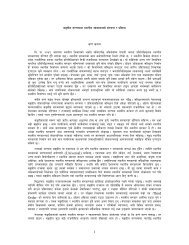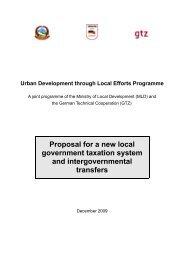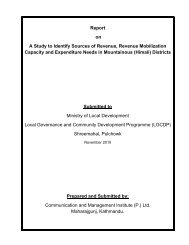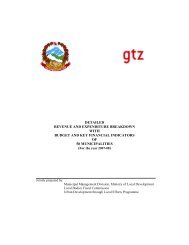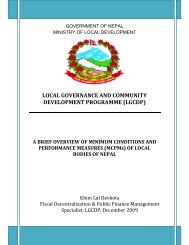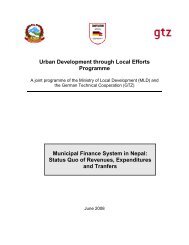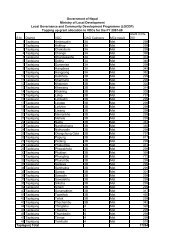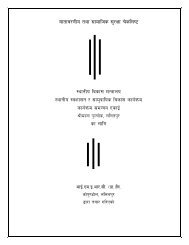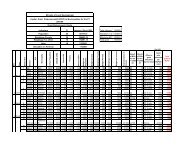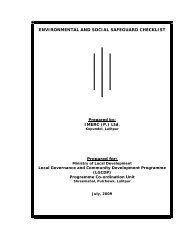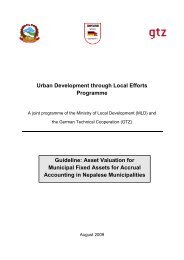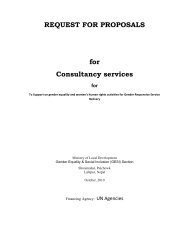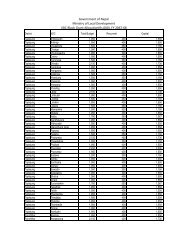GTZ Report on Accrual Accounting Status Quo - LGCDP
GTZ Report on Accrual Accounting Status Quo - LGCDP
GTZ Report on Accrual Accounting Status Quo - LGCDP
Create successful ePaper yourself
Turn your PDF publications into a flip-book with our unique Google optimized e-Paper software.
Findings and observati<strong>on</strong>s in the Nepalese municipalities 16<br />
• Udle then started to assist eight municipalities in the implementati<strong>on</strong> of the described accrual based accounting<br />
system (Dharan, Butwal, Dhangadhi, Nepalgunj, Pokhara, Hetauda, Banepa and Kathmandu) (Chhetri, 2002;<br />
udle, 2006).<br />
• The first attempts of implementati<strong>on</strong> <strong>on</strong> a piloting basis were made from January 1st of 2000 <strong>on</strong>wards in Dharan<br />
and after this in Butwal starting the implementati<strong>on</strong> <strong>on</strong> February 12th of 2000 <strong>on</strong>wards.<br />
• The accrual accounting system combined with the then newly developed software, supported by udle, was fully<br />
introduced in the fiscal year of 2001 in Dharan, Butwal, Dhangadhi, Nepalgunj and Kathmandu. In the following<br />
year Pokhara, Hetauda and Banepa followed. However, in the post implementati<strong>on</strong> phase different problems<br />
and obstacles led to the fact that <strong>on</strong>ly Dharan, Butwal and Kathmandu managed to c<strong>on</strong>tinue accrual<br />
accounting.<br />
Although udle assisted in the l<strong>on</strong>g term implementati<strong>on</strong> of accrual accounting in three municipalities and<br />
achieved a general sensitizati<strong>on</strong> towards accrual accounting at municipal level, the first attempts to introduce<br />
accrual accounting in selected municipalities had <strong>on</strong>ly limited success.<br />
After this, udle reduced its efforts and support in accrual accounting until 2007. However since <strong>on</strong>e year udle restarted<br />
major efforts in accrual accounting implementati<strong>on</strong> and is preparing a comprehensive implementati<strong>on</strong> scenario. This<br />
report is part of this process.<br />
Analysis and less<strong>on</strong>s learnt<br />
It is obvious that <strong>on</strong>ly those municipalities which received either str<strong>on</strong>g technical support from udle (Dharan and<br />
Butwal) or had accrual accounting <strong>on</strong> the agenda since a relatively l<strong>on</strong>g time (Kathmandu Metropolitan City)<br />
succeeded to c<strong>on</strong>tinue accrual accounting practice. Only KMC had enough resources to organize and finance extra<br />
accrual accounting training for their staff when udle support was not sufficient anymore, especially in the post<br />
implementati<strong>on</strong> phase.<br />
Major reported obstacles for the successful implementati<strong>on</strong> in the municipalities were:<br />
• Lack of sufficient training <strong>on</strong> manual as well as computerized accrual accounting practise. A proper<br />
general training before the implementati<strong>on</strong> which would have made sure that the accounting staff both knows and<br />
understands the c<strong>on</strong>cept of manual and computerized accrual accounting was missing. The same holds true for<br />
the post implementati<strong>on</strong> phase, where a l<strong>on</strong>g term, individual needs based refresher training as well as general<br />
technical back up and support <strong>on</strong> demand for all municipalities was missing.<br />
• Lack of c<strong>on</strong>ceptual clarity by the municipalities and other important stakeholders what accrual accounting<br />
actually is. This again indicates insufficient theoretical and practical informati<strong>on</strong>.



